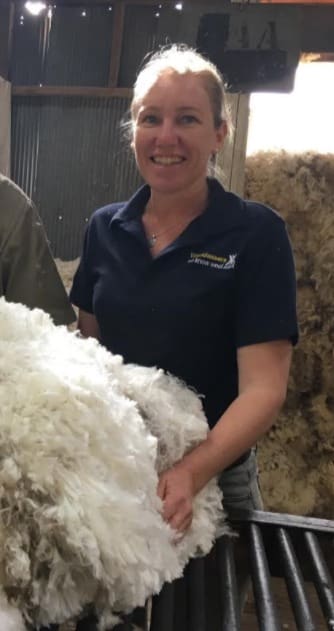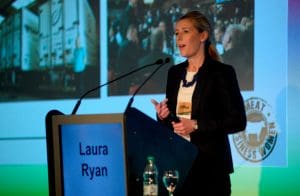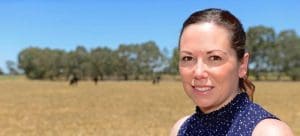AUSTRALIA’S wool industry is one agricultural sector which has proven to be a field of opportunity for young rural women.
And South Australian-based Elders district wool manager and professional wool classer Steph Brooker-Jones is a trail-blazing example of what can be achieved, including progression into corporate work, even by those not from a farming background.
In recognition of the International Day of Rural Women last week, the latest ANZ Agri Insights report said women were set to take a bigger role in Australia’s agriculture, with the number of women enrolled in agriculture, environmental and related tertiary courses increasing to 56 percent, meaning an additional 18,445 female graduates are expected to enter the workforce compared to 13,646 males. Women make up just 34pc of Australian agricultural employees and are estimated to provide about one third of all on-farm income today, compared to a significant 84pc of off-farm income.
Last week Mrs Brooker Jones posted a video of her story, from her completion of her wool classing certificate in 1977 with fellow student Susan Carn (nee Washington).
She told Sheep Central the influx of women into the industry increased in the 1980s and escalated in the 1990s with more people travelling internationally, as she did. She said women working in wool became more accepted with more couples travelling the world, although there was a lull during the Reserve Price Scheme period.
“Now the wool classers are mostly women.
“When I did it there were 50 student and just two females, now I think you would find it is probably 80pc females,” she said.
“I don’t think there a lot of males looking to do professional wool classing now.”
Steph said there is plenty of opportunity for women to undertake diverse roles in agriculture.
“Once you are in the network, you’ve got the opportunity, haven’t you?
“And whether it is because of your wool classing skills, your interpersonal or organisational skills, that’s how we, Elders, as a company, recruits people,” she said.
“Most of our district wool managers have been recruited by people within our group, that know the wool classers or anyone with wool experience, which is really hard to come by.”
Opportunities for all in wool

AWEX woolclasser registrar Fiona Raleigh
The Australian Wool Exchange’s first female wool classer registrar Fiona Raleigh said she was the only women working in her first shed a wool handler, a 20-stander, in 1990, and was regarded as a novelty. She gain her professional wool classer certification in 1990 and became AWEX’s registrar in 2015.
She said the industry has progressed from young male rousabouts barrowing sheep for shearers on a break and becoming either shearers or classers, to the situation now, where trained wool handlers, mainly women, become classers. This has been influenced by highly professional female wool handlers and classers from New Zealand. Fiona said there also now many full-time female shearers in the industry, including her daughter.
Fiona said 10 years ago she started a Facebook page called Jobs for The Girls and Australian Wool Innovation was funding Women In Wool workshops, promoting industry jobs.
“Well, I don’t need to do that anymore, because it’s done, the work’s done.
“Our wool classing competition winners have all been females, I believe we haven’t had a male winner, and most of them have gone onto wool positions within broking,” she said.
“Our top talents get snapped up because that wool knowledge is gold, that’s what the brokers are telling me, because they are the ones doing the wool courses and excelling.
“I hate to say that, I have really looked for young (wool-classing) men to be profiled (for AWEX BOARDTalk), but there are not many that want to be professional wool classers.”
Fiona now doesn’t see any need to specifically promote women into the industry.
“I just think that they are doing it and they doing the job well.
“They are in there and they are getting the opportunities, and there are any number of high profile examples, like Sam Wan at Elders and Candice Cordy (at Nutrien).”
She said young women in the industry simply need to have the knowledge, expertise and skills.
“You need to be the expert in your game and you will go places … anybody with the right skills is valuable.
“What I see in the wool industry now is lots of young people and women from non-farming backgrounds,” Fiona said.
“The gate is open, there is opportunity there, be an expert with the skills and you don’t have to come from a farming background.”
Room for growth for women in meat industry

Meat Business Women chair Laura Ryan.
In the international meat industry, women make up just 36pc of workforce, 14pc of board level director positions and only 5pc of chief executive roles, a study has found.
The independent report commissioned by Meat Business Women, also identified several ‘broken rungs’ in the career ladder that prevent women in the meat sector from advancing to more senior roles.
It suggested women find it easier to pursue careers in marketing, finance, human resources, research and development, and quality fields. However, those disciplines still rarely act as stepping stones into the most senior positions.
Meat Business Women founder Laura Ryan said a lack of gender representation is putting at risk the future success and sustainability of the meat sector.
“This report should be a wake-up call for the meat sector.
“Our findings show just how much the meat industry is lagging behind other sectors, including grocery, when it comes to creating workplaces that attract and promote female talent,” she said.
“In doing so, it is failing to reap the rewards that come from creating and nurturing a diverse workforce.”
Ms Ryan said it has been asserted that companies which have executive committees with female membership of at least 33pc have a net profit margin over ten times greater than those companies with no women at that level.
“Fundamentally businesses with diverse workforces are more profitable and have better share prices.”
The report draws on survey data from the UK, Ireland, Australia, New Zealand and the USA, and highlights that the lack of formalised mentoring, networking opportunities and senior female role models is a particular source of frustration for women in the sector.
The report said that visible role models who lead in an aspirational way help attract and retain talent within an organisation. The report flagged that by having relatively low numbers of women in senior roles, the meat industry gives the impression that leadership positions are either not available or not suited to women.
“The message we’re hearing from women in the meat industry is loud and clear: they love the sector, they’re excited about the opportunities it offers and they want to help it succeed, but certain barriers exist.
“Together industry and Meat Business Women can break those barriers down.”
Ms Ryan said MNW research has found there are lots of practical steps companies can take to improve gender representation and ensure female talent can thrive.
“It is our hope that the sector uses the insights from this report to better understand how it can create a diverse and inclusive workforce.
“Meat Business Women is already partnering with a significant number of organisations towards that goal.”
Meat Business Women intends to use the findings of this report to continue its support of the meat industry through a portfolio of initiatives such as mentoring programmes, networking events, development toolkits and other resources.
Meat Business Women was launched in 2015 with a goal of assuring sustainability of the meat sector by attracting and retaining the best possible talent. The organisation now has more than 5,500 members in the UK, Ireland, Australia, New Zealand and the USA and is recognised by the United Nations as a contributor to their sustainable development goals. The Australian Meat Industry Council is the exclusive Australian territory partner of Meat Business Women.
To view the report or learn more about Meat Business Women click here.
More places for Victorian Rural Women’s Network Leadership and Mentoring program

Victorian Minister for Agriculture Jaclyn Symes.
To mark the International Day of Rural Women, Minister for Agriculture Jaclyn Symes encouraged Victorian rural women in agriculture to apply for the Victorian Rural Women’s Network Leadership and Mentoring program.
Applications to take part in Leadership Victoria’s new ‘Women Leading Now’ program are now open, with four funded places on offer. This new two-day leadership is being delivered online in November.
The government said while a third of Victorian farmers are women and many more work on-farm as a secondary occupation, the state’s women remain under-represented in leadership and decision-making roles.
Ms Symes said as the state started to move to economic recovery, it’s vital that rural women’s voices inform decision-making at all levels so they can thrive and can contribute equitably to the recovery of rural and regional businesses and communities.
“This International Day of Rural Women, I encourage Victorian rural women to take the time to reflect on what’s important to them and consider how they can contribute their many skills and talents to drive their communities forward.”
The $500,000 Victorian Rural Women’s Leadership and Mentoring program was launched in 2018 to upskill more than 40 women over three years. The initiative offers access to programs covering board skills, governance, financial and business management, team-building, community collaboration and networking.
Applications are now open for the Women Leading Now program, with funded places for Regional Leadership’s three community-based programs based in Ballarat and the Western, Goulburn Murray and Wimmera regions set to open soon.
For more information and to apply, visit the Victorian Rural Women’s Network website here.

HAVE YOUR SAY